- Home
- Sarah Woodbury
Warden of Time (The After Cilmeri Series Book 8) Page 5
Warden of Time (The After Cilmeri Series Book 8) Read online
Page 5
“You are far too worldly and intelligent to be impressed by me,” I said. “As you showed in there, you have a mind and thoughts that aren’t to be dictated by others.”
“If I have offended your majesty in some way, I apologize.” Romeyn bowed deeply.
“Stand up,” I said. “That’s not what I meant. You said what you thought needed to be said, and it happened to be in support of me. How can I be sorry about that? Next time, however, I’d like a little more warning of where you stand.”
Romeyn straightened. “Yes, sire.”
Aaron appeared out of a recess in the corridor behind Romeyn, reminding me that I needed to speak to him too. This whole thing with the pope and the papal legate had way too many moving parts. I glanced at Aaron, held up a hand to signal him to wait, and turned back to Romeyn.
“You, Peckham, and I need to have a talk in private. I’ll expect you both at the castle tomorrow.”
“Yes, sire.” He bowed again.
Callum and Carew had joined me, and I shrugged into the black cloak Carew draped again over my shoulders, glad of it now that we were in the chilly corridor and away from the fire. While Carew, Callum, and I headed towards Aaron, Romeyn reentered the dining room.
“I am very glad to see you,” I said when I reached him.
“And I you, sire,” Aaron bowed his head.
“How ill is Acquasparta, really?”
“Ill enough,” Aaron said. “He hasn’t deceived you in that regard, even if he looked well today. I’ve just come from his chambers.”
I studied my mother’s old friend. Gray strands peppered his dark hair and his full beard was almost entirely white, but his brown eyes were just as bright and intelligent as ever. “But is he deceiving me in some other way?”
“I don’t know, sire, but I feel there is more here than meets the eye,” Aaron said. “I ask that you be very careful going forward.”
“The audience was certainly unusual,” Carew said.
Aaron and Carew were old acquaintances. Both had stood at my side since before King Edward’s death. “In what way?” Aaron said.
I, too, was interested in why Carew thought so. Other than the four years I’d been King of England, I had no experience with affairs of state at the level of dealing with a papal legate. Carew hadn’t had much either, but he’d at least been to court and seen the way things were done.
“He asked three things of the king, none of which he is likely to accede to easily.” Carew looked at me. “And offered nothing in return.”
“He thinks I’m weak,” I said.
“Pope Boniface thinks you might be weak,” Callum said. “I can’t read Acquasparta well.”
“A good emissary transmits the message without ever conveying his own thoughts,” Aaron said, “but it’s more than that. I think—”
Aaron didn’t get a chance to finish his thought. A sudden commotion—shouts and chanting beyond the walls—had the four of us swinging around to face the front doors, which were just visible from the corridor through the anteroom that led to the main courtyard of the palace.
“Stay here, my lord.” Carew strode towards the large doors.
Romeyn reappeared out of the dining room doorway and hastened past until he was at Carew’s heels. Upon reaching the entryway, Callum wrenched one of the great doors open. Sound exploded into the palace. In a moment, I was at the doors too. The rain had turned to mist, and with the waning of the day a fog had risen—but I could see beyond the erect postures of my guard of thirty who were standing between me and the gates of the Archbishop’s palace. The commotion lay beyond them: a crowd in the street looked determined to batter down the gate.
“What’s happening?” Peckham hobbled towards us from the western wing of his palace. Acquasparta followed, though he leaned heavily on the arm of another man, who was dressed in red as he was, but much more simply. I didn’t recognize the man but guessed him to be the cardinal’s secretary, who hadn’t been at our meeting, though I supposed he could have been hiding behind a curtain in a corner to take his notes.
“I don’t know,” I said.
Carew hovered in the doorway, taking in the scene, and then he and I together went down three steps to stand on the stairs, the better to get a sense of what was happening outside the gates. The chanting and shouts grew louder as a young man in his early twenties was hauled up to the gate by four men wearing the livery of the Archbishop of Canterbury. The crowd was growing by the second, and hands reached out to press them forward.
One of the men in livery shouted, “Let us in!”
Wide-eyed, the two men who manned the gatehouse moved to the gate. Justin, the captain of my guard, started forward with his hand up. “Stop!” he said, but it was too late. One of the guards had already released the lock. The four guards and their prisoner squeezed inside the courtyard, and then the two guards at the gate struggled to close it again.
With the help of Justin and two more of my men, who’d followed him, they finally managed to slide the bar home, locking out the crowd. It had grown to easily a hundred strong. And it was still growing by the second, every single member calling for the prisoner’s head. The man’s hands had been tied behind his back, and his face was bloody from a beating. If not for the gate between the courtyard and the crowd, this could have turned into a lynching.
The prisoner wore dirty brown breeches and a shirt of an indeterminate color. Perhaps it had once been blue, but the front was smeared with mud, soaked with rain, and torn at the left shoulder. His dark brown hair was wet from the rain and plastered to his head with a darker fluid that might have been blood. Justin hastened back towards me, his face a thundercloud, and one of the four soldiers followed. His three companions stayed nearer to the gate, holding the prisoner, who swayed on his feet but managed to remain upright. My own guard was blocking the path to the steps, but at Justin’s signal, my men parted to let the Archbishop’s soldier through.
He didn’t look at me. Perhaps he didn’t know who I was. “We found him, your eminence.” He spoke to Acquasparta.
I was standing on a lower step, three down from the doorway, and turned to look up at Acquasparta, unaware that he’d taken up a position behind me. The double doorway into the palace was now fully open, with a half-dozen men, from servants to churchmen, gaping at the crowd at the gate.
Acquasparta nodded sagely. “You have done well.”
Peckham edged his way into the doorway to Acquasparta’s side. “What … what have you done?” He looked from Acquasparta to the crowd, and then his hand clutched at the robes at his chest.
Even as I watched, Peckham’s face paled, and he staggered slightly. Callum was standing behind him and caught him as he fell. “Aaron!” Callum called the doctor’s name as three servants helped to half-carry, half-drag the Archbishop back into the recesses of the palace.
A moment later, I was in front of Acquasparta, my hands clenched, wanting to wipe the smirk from his face, but having to do it with my voice instead of my fists. “Answer the Archbishop’s question!”
“We had word that a heretic had come to live in Canterbury and was gaining followers. Our only recourse was to arrest him. With the proper motivation, it may be that we can return him to the fold, guide him to the better path as Archbishop Romeyn said.” Acquasparta spoke these words with a nod at Romeyn, who had come to stand on the steps too. “At the very least, he can tell us who his compatriots are and we can root out this infection before it spreads.”
Acquasparta appeared to believe every word he said.
I stabbed a finger in the direction of the crowd. “Those people aren’t here to question your prisoner. This is a mob. They want his head.”
Behind me, the volume had risen as the people strained forward, more and more of them pressing against the gate. History told me I wasn’t exaggerating. The people of Canterbury had slaughtered their Jewish neighbors in a mass riot only thirty years ago. It was easy to see how it had come about. I didn’t want them
to do the same to this heretic.
“Let me through! Let me through!” A palace guardsman on horseback approached the gate. The people gave way for him, but to my horror, the palace gatekeeper moved to the gate with the clear intent to open it.
As had been the case with Justin, even if he’d heard my call of “No!” over the noise of the crowd, it was too late. He’d already pulled the bar across. The gate swung open and the crowd surged past the horseman, overwhelming the guard, who stumbled backwards, his mouth wide and protesting.
“Idiot,” I said to myself under my breath. “What did he think was going to happen?”
This was going to get out of control really quickly, and I didn’t know if I could do anything about it. For the moment, those in the front line of the crowd seemed a bit uncertain now that they were actually inside the palace—a place none of them had probably ever been. They milled around, filling in the space between the gatehouse, the stable, and where the three guards still stood with the prisoner. Most still hung back, some of their anger dissipating now that they’d achieved their goal of entering the palace grounds. At any second, however, the volatile crowd could become violent again.
Carew stood at my right shoulder, half a step in front of me. Without weapons, all my own men could do was defend me as best they could, and they formed a tight semi-circle around the steps, buttressing and protecting the palace entrance. The commotion would eventually catch the attention of the city garrison and my other men, but it hadn’t yet. They were busy with a murder and, undoubtedly, had assumed I was safe inside the Archbishop’s Palace.
Acquasparta seemed either to have no idea how dangerous the situation was, or it had become exactly what he wanted, because he didn’t move, just stood on the top step with a slight smile on his face.
Then Acquasparta threw fuel on the fire. “Take him to a cell!”
How anyone could hear the papal legate’s words over the noise coming from the crowd I didn’t know, but as soon as those in the forefront realized that the prisoner was only to be arrested, not hanged, they gave a roar and stormed forward.
A moment later, the prisoner was ripped from his guards’ hands. I lost sight of him and thought he’d gone down under their feet, but then I spotted him again, another twenty paces away, wrestling with his captors. With mounting horror, I watched them drag him through the gates of the palace. Someone had already placed a rope around his neck in a noose.
I swung back to Acquasparta and hissed, “This is your fault. Do something!”
But Acquasparta’s lips were white around the edges as he gaped at his handiwork. I wanted to shake him. His secretary was urging him to reenter the palace proper, for his own safety, but then Acquasparta surprised me by waving him off. He raised his hands in motion of appeasement and said, “Stop! Stop this madness!”
His words were barely audible to me, much less to the crowd, which was no longer facing the palace entrance anyway. Certainly, they had no effect. Then his secretary spoke urgently to him again in Italian, and Acquasparta retreated back into the palace, looking frailer than ever. As he left, the mist turned again to a light rain, and a gust of wind blew the fine droplets into my face.
Justin had backed up the steps to stand beside Carew to better protect me. “They’re going to kill him,” he said.
Chapter Seven
I snarled at Justin, “I know they’re going to kill him!” I spun this way and that, looking for a way out of this, looking for ideas.
Carew’s face was intent. “We need a plan.”
“We bloody well do need a plan!” I said. “Any suggestions?”
“We can’t stop it, not with only thirty of us and no weapons beyond our belt knives.” Justin’s red hair was plastered to his head, which was why my Welsh archers had nicknamed him Goch.
“I’m not sure weapons would help if it meant killing civilians,” I said.
“We have to stop it. Come, sire, out of the rain while we regroup.” Carew took the steps back up to the palace two at a time, passing Romeyn, who still stood in the doorway, his brow furrowed in thought.
Cursing Acquasparta and his stupidity, I gestured for my men to follow Carew. “Get everyone inside. We have maybe a minute to figure out how to stop this.”
Justin gave a piercing whistle, and ten seconds later, my men had retreated inside the anteroom of the palace. Callum returned, looking grave, but I didn’t ask him how Peckham was. We had no time, and the knowledge of the Archbishop’s health wasn’t going to save the young man out there.
“Someone said that this is Acquasparta’s doing?” Callum said.
“It seems so, but he can’t help,” Romeyn said. “The guards arrested the heretic on his orders, but he either didn’t count on the crowd or he underestimated it.”
Callum nodded, accepting for now what he couldn’t change. What was important was saving the young man. While that was a given to Callum, I saw hesitation in the eyes of several of my men. I didn’t have time to dispel it, but perhaps I didn’t have time not to either.
“For what purpose did God give man a mind if not to use it?” When it became clear that I was going to have a major confrontation with the Church over heresy, my mother and Callum had given me a primer on Luther, Milton, and freedom of religion. I was about to see if I could actually articulate what they’d asserted. “When did thinking become a crime in England?” As I spoke, I looked in particular at one man whose name was Thomas. His size made him a formidable fighter, but when he wasn’t soldiering, he tended towards quiet and thoughtful.
Thomas answered immediately. “It could never be a crime, sire.” And then he quoted from the Bible: “You then, why do you judge your brother? For we will all stand before God’s judgment seat.”
That was from Romans, and as soon as we were out of here, Thomas was going to get a promotion. But he was talking about the behavior of the crowd, which was reprehensible, and for which they could be condemned. The issue at hand, however, was heresy. I didn’t know what this heretic believed, and I didn’t care. If I was going to save him and all the others I’d welcomed into England, I needed to uproot the very idea that a man could be condemned for his beliefs.
I wasn’t good at this, really, but Callum had carefully written out what to say if the occasion ever arose, so I parroted it: “Does not Exodus say, ‘Who has made man's mouth? Who makes him mute, or deaf, or seeing, or blind? Is it not I, the Lord?’” I tried not to look at Romeyn. This was his jurisdiction, not mine, but he’d taken a step back from my circle of men, not interfering with my speech with them, and his face gave nothing away.
The men gathered around me to listen, and several nodded, though I saw puzzlement on others’ faces. Most people in the Middle Ages didn’t spend any time thinking about issues of theology. They were lectured at by priests, but services were in Latin, which few understood. It was the ritual that was important, which made the peoples’ hatred of heretics all the more strange to me, since most people couldn’t even tell you what the difference was between what they believed and what heretics believed and why it was important.
Acquasparta had known that, of course. Every rabble rouser since the beginning of time knew that people were easily led and once aroused would go where a charismatic man pointed.
“I say to you that each of us understands God’s message according to his ability and God’s grace. My England will not infringe on any man’s right to come to his own understandings,” I said, and then quoted Milton: “‘Give me the liberty to know, to utter, and to argue freely according to conscience, above all liberties.’’
Except for my voice, the silence in the corridor was absolute. I had thirty faces staring at me. I didn’t know that I’d ever had such an audience or such a need for eloquence. I made a fist and brandished it. “Whether you knew it or not, you have always had that right, no matter what your king or your priest said. That right is innate in all of you. And just as each one of you has the right to speak your mind in your own home or amo
ng your companions, so this man has that right. I will not take it from you. I will not allow that crowd to take it from him.”
Romeyn licked his lips. “We could set fire to the stables.”
I stared at him, astonished and within inches of laughing that such a suggestion had come from him. “Thank you. That might have worked if everything wasn’t already soaked and the crowd had remained within the palace.” I shook myself. “I have an idea: everybody strip off your livery.”
Justin didn’t hesitate to obey, and as he disrobed, the rest of my guard followed. In turn, I tightened my black cloak around myself, making sure I was completely covered. My breeches and boots were that of a nobleman, which couldn’t be helped, but I wanted to hide that I was the king of England, up until the moment I revealed it.
“Callum and Carew are going to get me to the heretic,” I said. “The rest of you must disperse through the crowd. When I reach wherever they intend to hang this man, I’m going to throw off my cloak and raise my hands above my head. That is your cue to shout, ‘the king, the king’ until the crowd listens. I will start to speak, and at the end of every sentence, you need to cheer me on.”
“Of course, sire,” Justin said, and there were nods all around.
Callum looked darkly at them. “Regardless of what he says.”
I hoped Callum’s words weren’t necessary, but faith was a funny thing, and while everyone in my guard was an excellent fighter, not all were thinkers or leaders. Fortunately to them, I, not Acquasparta, was the highest authority after God. They would obey.
“Let’s go.” I headed back to the front door and down the steps. While we’d been inside, the sounds of the crowd had diminished, which had me a bit worried we’d be too late. Once outside again, however, I could hear them farther down the street.
“They’re by the cathedral,” Carew said.

 The Good Knight
The Good Knight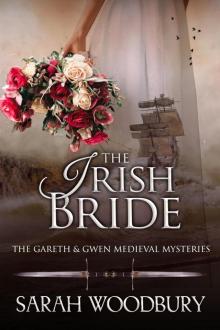 The Irish Bride
The Irish Bride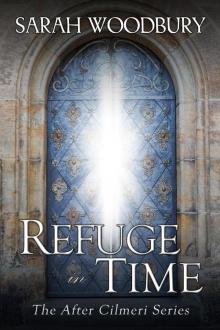 Refuge in Time
Refuge in Time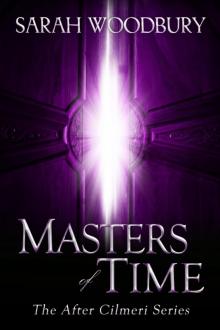 Masters of Time
Masters of Time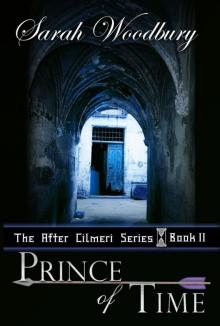 Prince of Time (Book Two in the After Cilmeri series)
Prince of Time (Book Two in the After Cilmeri series)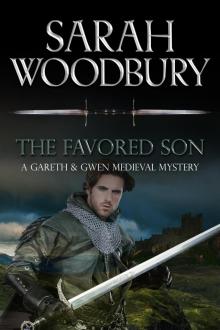 The Favored Son
The Favored Son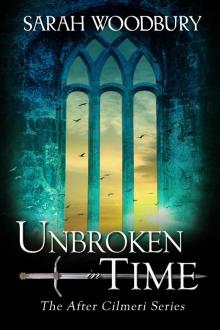 Unbroken in Time
Unbroken in Time![[The Lion of Wales 01.0] Cold My Heart Read online](http://i1.bookreadfree.com/i/03/22/the_lion_of_wales_01_0_cold_my_heart_preview.jpg) [The Lion of Wales 01.0] Cold My Heart
[The Lion of Wales 01.0] Cold My Heart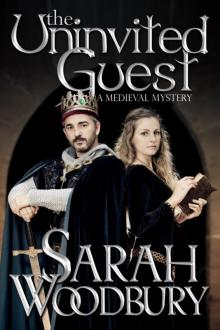 The Uninvited Guest
The Uninvited Guest The Pendragon's Blade (The Last Pendragon Saga Book 2)
The Pendragon's Blade (The Last Pendragon Saga Book 2)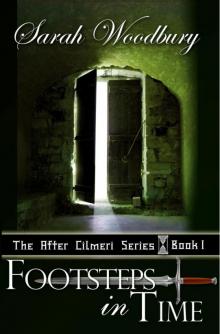 Footsteps in Time
Footsteps in Time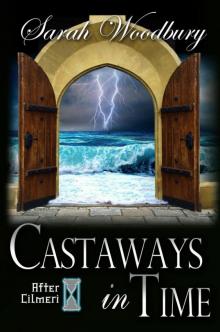 Castaways in Time (The After Cilmeri Series)
Castaways in Time (The After Cilmeri Series) Winds of Time
Winds of Time Of Men and Dragons (The Lion of Wales Book 3)
Of Men and Dragons (The Lion of Wales Book 3) Champions of Time
Champions of Time The Pendragon's Challenge (The Last Pendragon Saga Book 7)
The Pendragon's Challenge (The Last Pendragon Saga Book 7)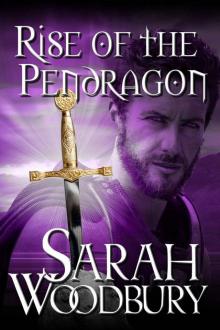 Rise of the Pendragon (The Last Pendragon Saga Book 6)
Rise of the Pendragon (The Last Pendragon Saga Book 6) The Worthy Soldier
The Worthy Soldier The Last Pendragon (The Last Pendragon Saga Book 1)
The Last Pendragon (The Last Pendragon Saga Book 1) The Fallen Princess
The Fallen Princess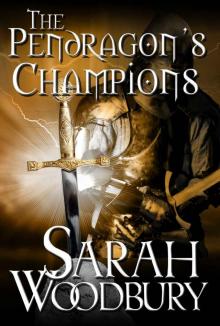 The Pendragon's Champions (The Last Pendragon Saga Book 5)
The Pendragon's Champions (The Last Pendragon Saga Book 5)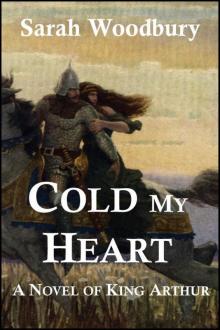 Cold My Heart: A Novel of King Arthur
Cold My Heart: A Novel of King Arthur A Long Cloud (The Lion of Wales Book 4)
A Long Cloud (The Lion of Wales Book 4) Frost Against the Hilt (The Lion of Wales Book 5)
Frost Against the Hilt (The Lion of Wales Book 5) Daughter of Time: A Time Travel Romance
Daughter of Time: A Time Travel Romance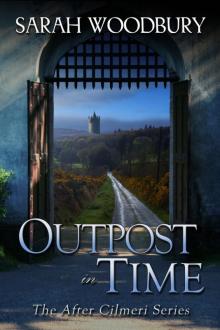 Outpost in Time
Outpost in Time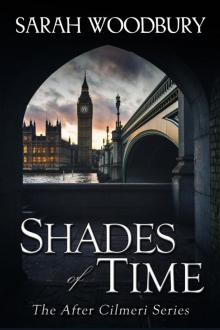 Shades of Time kobo
Shades of Time kobo The Pendragon's Quest (The Last Pendragon Saga Book 4)
The Pendragon's Quest (The Last Pendragon Saga Book 4) The Unexpected Ally
The Unexpected Ally Crossroads in Time (The After Cilmeri Series)
Crossroads in Time (The After Cilmeri Series)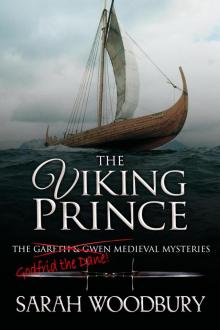 The Viking Prince
The Viking Prince The Renegade Merchant
The Renegade Merchant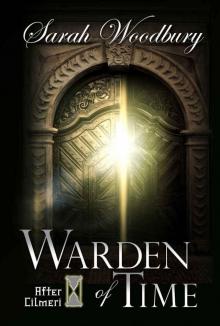 Warden of Time (The After Cilmeri Series Book 8)
Warden of Time (The After Cilmeri Series Book 8)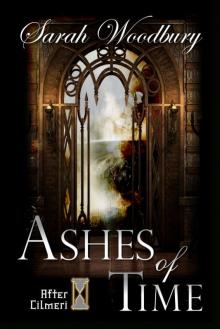 Ashes of Time (The After Cilmeri Series)
Ashes of Time (The After Cilmeri Series) Exiles in Time (The After Cilmeri Series)
Exiles in Time (The After Cilmeri Series)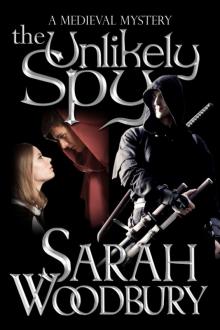 The Unlikely Spy
The Unlikely Spy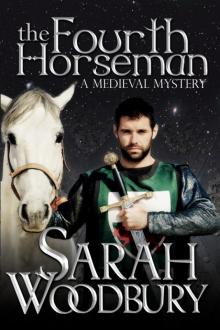 The Fourth Horseman
The Fourth Horseman The Oaken Door (The Lion of Wales Book 2)
The Oaken Door (The Lion of Wales Book 2) Song of the Pendragon (The Last Pendragon Saga Book 3)
Song of the Pendragon (The Last Pendragon Saga Book 3) Champions of Time (The After Cilmeri Series, #13)
Champions of Time (The After Cilmeri Series, #13) Guardians of Time
Guardians of Time The Bard's Daughter (A Gareth and Gwen Medieval Mystery)
The Bard's Daughter (A Gareth and Gwen Medieval Mystery)